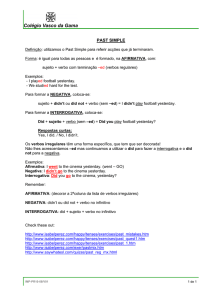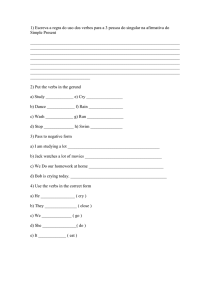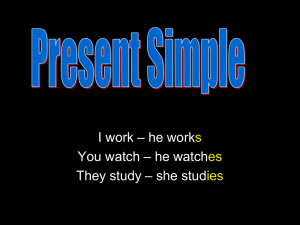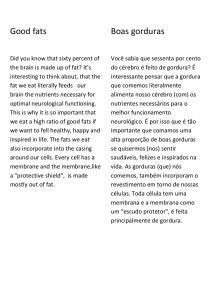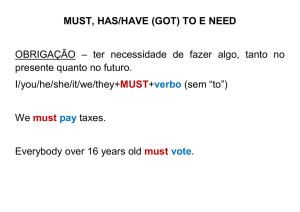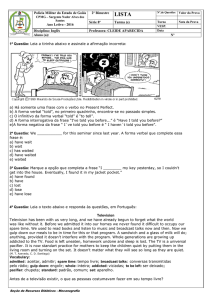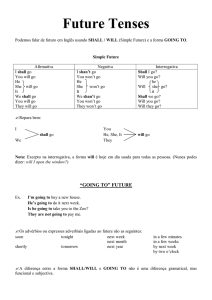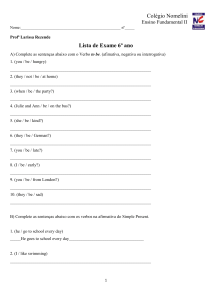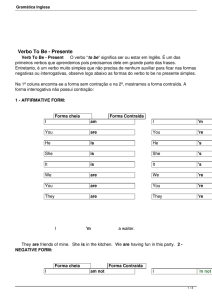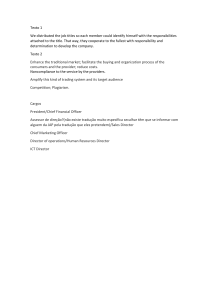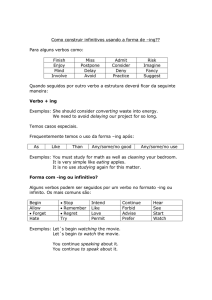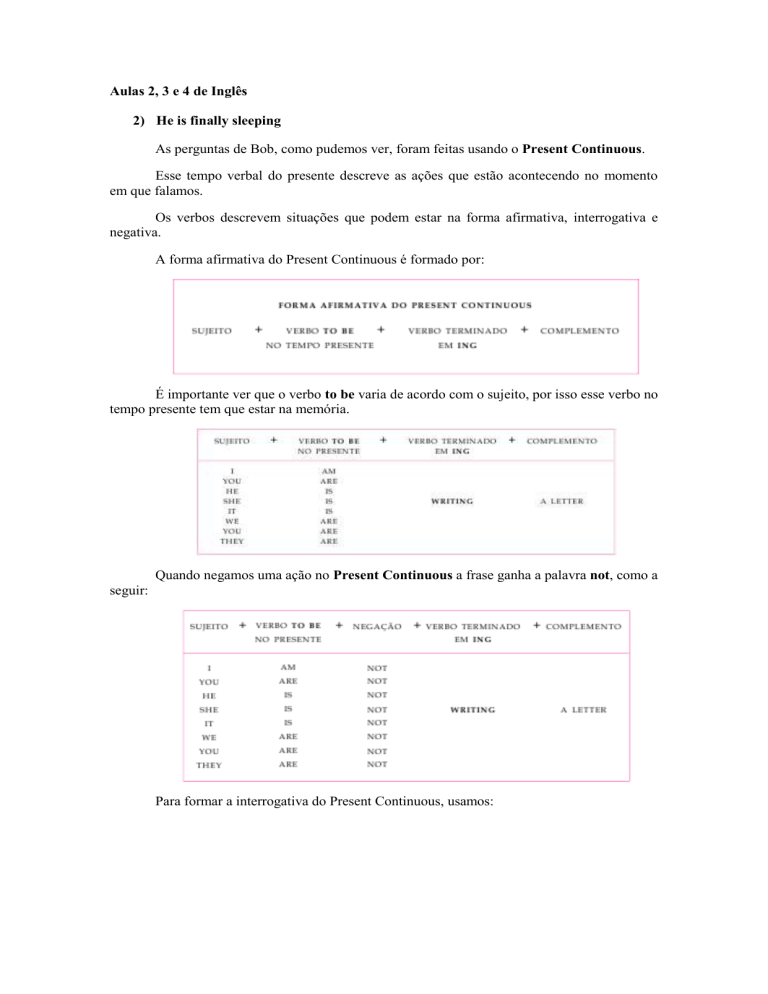
Aulas 2, 3 e 4 de Inglês
2) He is finally sleeping
As perguntas de Bob, como pudemos ver, foram feitas usando o Present Continuous.
Esse tempo verbal do presente descreve as ações que estão acontecendo no momento
em que falamos.
Os verbos descrevem situações que podem estar na forma afirmativa, interrogativa e
negativa.
A forma afirmativa do Present Continuous é formado por:
É importante ver que o verbo to be varia de acordo com o sujeito, por isso esse verbo no
tempo presente tem que estar na memória.
Quando negamos uma ação no Present Continuous a frase ganha a palavra not, como a
seguir:
Para formar a interrogativa do Present Continuous, usamos:
It, que é usado para substituir os nomes de animais e objetos, também pode ser usado de
forma impessoal.
Exercícios:
1) Responda as perguntas, de acordo com a forma pedida entre parênteses:
Exemplo:
Beth, are you making a cake?
(afirmativa) Yes, I am. I am making a chocolate cake.
a) Ian, what are you doing?
(afirmativa - read a magazine) ..................................................................
b) Is he playing football?
(negativa - tennis) .....................................................................................
c) Are you taking care of the baby?
(negativa)................................................ . Michael is taking care of Jim.
d) Is it raining?
(afirmativa)................................................. and my umbrella is at home.
e) Where are you going, Nei?
(afirmativa - to the bank) ..........................................................................
f) Are they having lunch at the cafeteria?
(afirmativa) ........................................... . They are having hamburguers.
g) Are you watching TV?
h) (negativa) ................................................... . I am doing my homework.
3) What do you do?
Vamos dar uma olhada nas frases que apareceram na história?
I don’t know this game!
She answers the telephone.
She writes a letter.
They play soccer.
He plays soccer.
A conjugação completa do Simple Present na forma afirmativa é:
Exercício 1: Complete com os verbos na forma afirmativa:
Exemplo: I know you. (to know)
a) He ......................... me. (to know)
b) That mother ......................... the baby several times. (to kiss)
c) Nei ......................... pop music. (to love)
d) I ......................... you. (to love)
e) We ......................... cards every week. (to play)
f) Beth and David ......................... Ian to the Zoo. (to take)
Na forma negativa, os verbos no Simple Present apresentam a seguinte estrutura:
Exercício 2: Passe as frases do exercício 1 para a negativa:
Exemplo: I know you. (afirmativa) / I do not know you.
a)
b)
c)
d)
e)
f)
............................................................................................................................
............................................................................................................................
............................................................................................................................
............................................................................................................................
............................................................................................................................
............................................................................................................................
Do you go to the park every day?
Como vemos na forma interrogativa, o verbo auxiliar vem antes do sujeito e do verbo
principal.
Vamos conferir a estrutura das frases interrogativas?
Exercício 3: Passe as frases do exercício 1 para a forma interrogativa:
Exemplo: I know you. (afirmativa) / Do you know me?
a)
b)
c)
d)
e)
f)
............................................................................................................................
............................................................................................................................
............................................................................................................................
............................................................................................................................
............................................................................................................................
............................................................................................................................
Exercício 4: Complete as frases usando a forma pedida entre parênteses.
Exemplo: Bob goes to the park everyday. (afirmativa - to go)
a) Mark and James ......................... a lot. (negativa - to talk)
b) ........... Júlio ......................... letters to his friend? (interrogativa - to write)
c) Virgínia ......................... cigarettes. (negativa - to like)
d) Washington ......................... machines. (afirmativa - to fix)
e) ........... you ......................... where my recorder is? (interrogativa - to know)
f) Gabriel ......................... English. (negativa - to teach) He .........................
(afirmativa - to teach) Mathematics.
g) Where ........... you ......................... everyday? (interrogativa - to go)
h) Nei ......................... to travel around the world. (afirmativa - to want)
4) But today...
Quando descrevemos ações que acontecem no momento em que estamos falando - now
- usamos o Present Continuous.
I am going to the supermarket now.
Quando descrevemos ações que acontecem frequentemente - everyday, every week,
every night, on Tuesday, in the morning etc. - usamos o Simple Present.
I take a cup of coffee when I wake up everyday.
Exercício: Coloque SP para as frases que estão no Simple Present e PC para as frases
que estão no Present Continuous:
a) Where are you going? (
)
b) We are going to the park. (
)
c) We go to the park everyday in the morning. (
d) Do you want to come with us? (
e) Is Beth late? (
)
)
)
f) She goes to work at 8:30 a.m. (
)
g) But today she is going to work now. (
)
h) Look! Mrs. Correa goes to the supermarket at 9 a.m. (
i) But today she is going to the supermarket now. (
)
)

